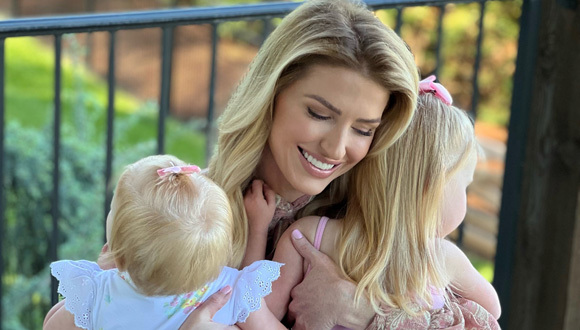10 Years Out From Brain Surgery and Grateful for Each Day: Kristin's Story
May 4, 2022 - Patti MuckA decade ago, Kristin Daniell Isham was working every day without a break, a makeup artist with her own business. She envisioned having a family, but debilitating migraines kept those dreams at bay.
"They were like an ice pick in my brain," the 40-year-old recalls. "They were excruciating. We thought they were hormonal migraines."
But one day while working with a client, the right side of Kristin's body became paralyzed and she began having trouble speaking. Emergency room scans revealed the unthinkable — the otherwise healthy young woman had a brain tumor the mass of a tennis ball pressing against the lining of her brain on the top left side.
Houston Methodist neurosurgeon Dr. David Baskin says the noncancerous mass was ominous, particularly because it was located in a region that affects not just speech, but also motor skills and power on the right side of the body.
"I was in shock more than anything," Kristin says. "I thought they were hormonal migraines for years and years. It was not only something more than that, it was so life changing and drastic."
Dr. Baskin used three technologies to eradicate the tumor, known as a meningioma. Virtual reality provided an accurate picture of Kristin's brain in real time. A sophisticated, high-magnification surgical microscope enabled Dr. Baskin to dissect the tumor millimeter by millimeter without causing any damage to the nearby brain. And ultrasound allowed him to shatter the tumor's core and "peel away the rind" while preserving all brain function.
A new lease on life
A self-described "rule follower," Kristin took Dr. Baskin's words to heart that her body needed rest. She slowed down and made healing her priority. "I felt the recovery process was so important to the rest of my life," she says.
Kristin tells her story in a Houston Methodist video. She also recorded a YouTube video to support other brain tumor patients and to let women know migraines can be more than they seem.
Earlier this year, she sent an anniversary email to Dr. Baskin: "I can't believe it's already been 10 years since you did my brain surgery! Just wanted to thank you again for being so caring and such a fantastic surgeon all around … it made all the difference! Feeling very grateful for my life today! :)"
Kristin's life since her 2012 brain surgery is healthy and full. Married and living in Tennessee, she's a mother to two daughters, one 3, one 10 months. She put the career she loved on hold to spend more time with family and friends.
Strangely enough, the tumor experience made Kristin's life better, she says. Not only did her migraines go away, but "it forced me to stop and not overdo. You can work hard and achieve your goals, but it's important to take care of yourself, your body and your loved ones."
Brain surgery technology has exploded since Dr. Baskin operated on Kristin. Neurosurgeons at Houston Methodist now have a complex virtual reality device, allowing them to fly through the patient's brain and study a tumor's anatomy and relationship to blood vessels and other critical brain structures.
"Imaging accuracy has advanced where we can now make imaging as accurate as one millimeter," Dr. Baskin says. "We have hundreds of new micro-instruments and ultrasonic devices that can precisely shatter apart even calcified tumor with bone within it."
While brain surgery has advanced, the human element remains a vital, unchanging part of the story. To that end, Dr. Baskin has shown Kristin's Peak Center video to more than 100 meningioma patients.
A message of hope to other patients
"One can see gloom turn to hope, and despair turn into smiles as they watch the video, because they can see that they can have the surgery and walk away from it with only a few minor bumps on their head," Dr. Baskin says. "I am grateful to Kristin and many other patients for sharing their stories and bringing hope to so many other patients."
The most enduring element of the story is the brain itself — mysterious, adaptable, resilient. Kristin regards it with "wonder."
"I'm mesmerized by the whole thing," she says. "It's fascinating to me that it went from a healthy brain, grew this tumor that pressed on it for so long, then healed. My hair grew back and my brain is healthy." She looks at it now as a "minor setback."
"I give full credit to God for orchestrating this situation so perfectly and guiding me to such a gifted surgeon," Kristin says. "I truly believe my faith played such a huge part in this."
Dr. Baskin shares Kristin's "wonder" about the human brain, which has 30 billion neurons, every one of which can have many thousands of connections. "Even the most sophisticated computer cannot come close," he says. "It is likely that humans have capabilities and senses that we don't even know about."
Kristin thinks of her brain surgery nearly every day, but not with gloom and doom. "More just gratefulness to be alive," she says. And every moment with her daughters — Mother's Day and every day — is a blessing to be cherished.








